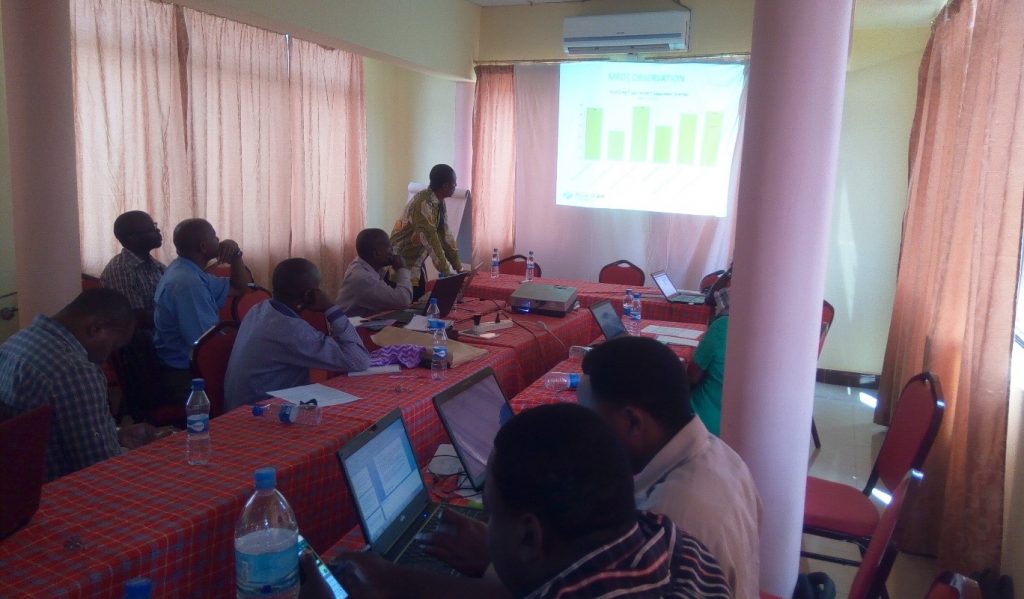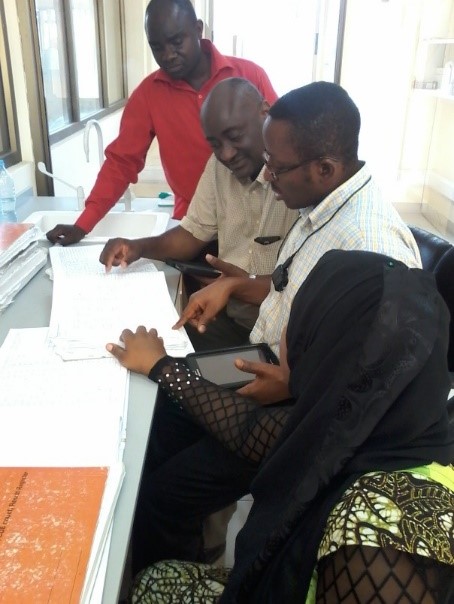
MalariaCare staff works with district supervisor on conducting a register review to assess adherence to test results using the EDS.
To improve the quality of malaria case management in Tanzania, MalariaCare, PMI’s global flagship project for case management, worked closely with the Tanzanian National Malaria Control Program (NMCP) to implement outreach training and supportive supervision (OTSS) visits. As part of OTSS, MalariaCare developed and introduced the Electronic Data System (EDS), a tablet-based, open-source Android application to guide supervisors in providing on-site mentoring and to better track health facility performance over time. With more complete and timely data available due to the EDS, Regional Malaria Focal Persons were able to use this data to guide decision-making and improve the quality of malaria case management. Some examples of key actions taken using the data are:
- In Geita region, supervisors found that five of the six labs visited were using Field stain to prepare microscopy slides, which was against national guidelines. They thus directed districts to enforce the use of Giemsa stain instead. By the fourth OTSS visit, five of the six labs were using Giemsa stain.
- In Mwanza region, only 40 percent of facilities visited had RDTs in stock at the first OTSS visit, and only 60 percent of malaria cases were confirmed by a diagnostic test. With this information, regional authorities trained health facility staff on the use of RDT stock reporting forms, helped to redistribute stock within the districts, and mentored health workers on the importance of testing prior to treatment. Following these efforts, the percentage of facilities with RDTs in stock steadily rose, and by the fourth OTSS visit, 88 percent of facilities had RDTs in stock, and 98 percent of malaria cases were confirmed with a diagnostic test.

MalariaCare staff works with district supervisor on conducting a register review to assess adherence to test results using the EDS.
It was due to successes like these that the NMCP decided to adopt the EDS as the national platform for the new Malaria Service Data Quality Improvement (MSDQI) supervision program. To support this effort, MalariaCare provided technical assistance to the NMCP in revising and adding to the OTSS checklist and programmed the finalized checklists into the EDS. MalariaCare also trained NMCP, the Ministry of Health, and implementing partner staff in EDS administration, so that they could operate and trouble-shoot the system independently. The project team and NMCP co-led the training for implementing partner staff on the use of EDS during supervision visits. Since the close of MalariaCare in Tanzania, another implementing partner already conducted supervision visits using the new MSDQI electronic platform; the NMCP plans to start implementing MSDQI visits later in 2017.
